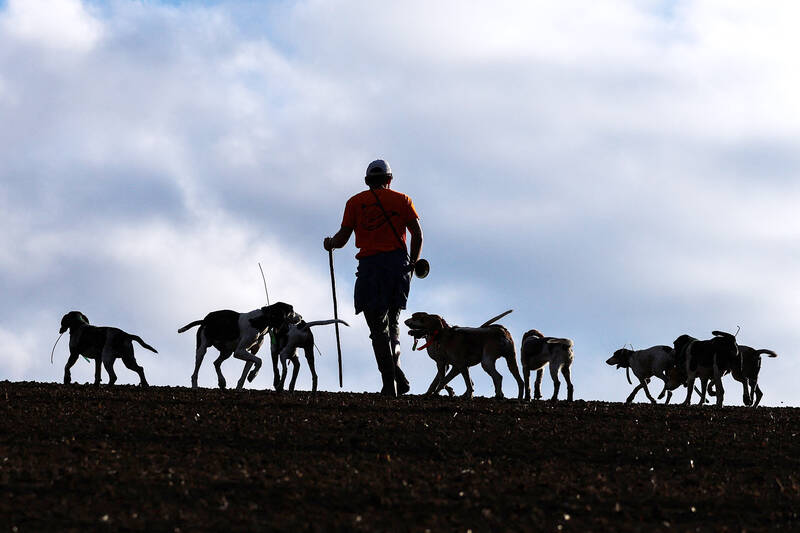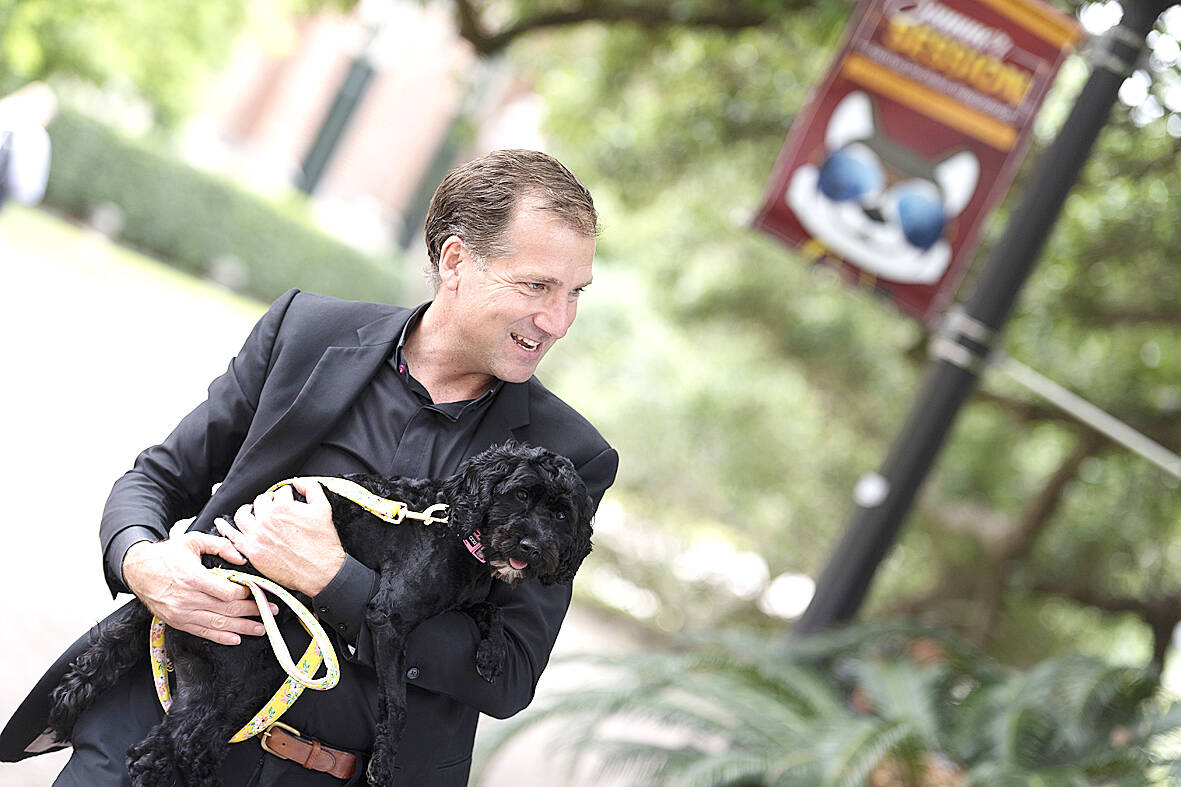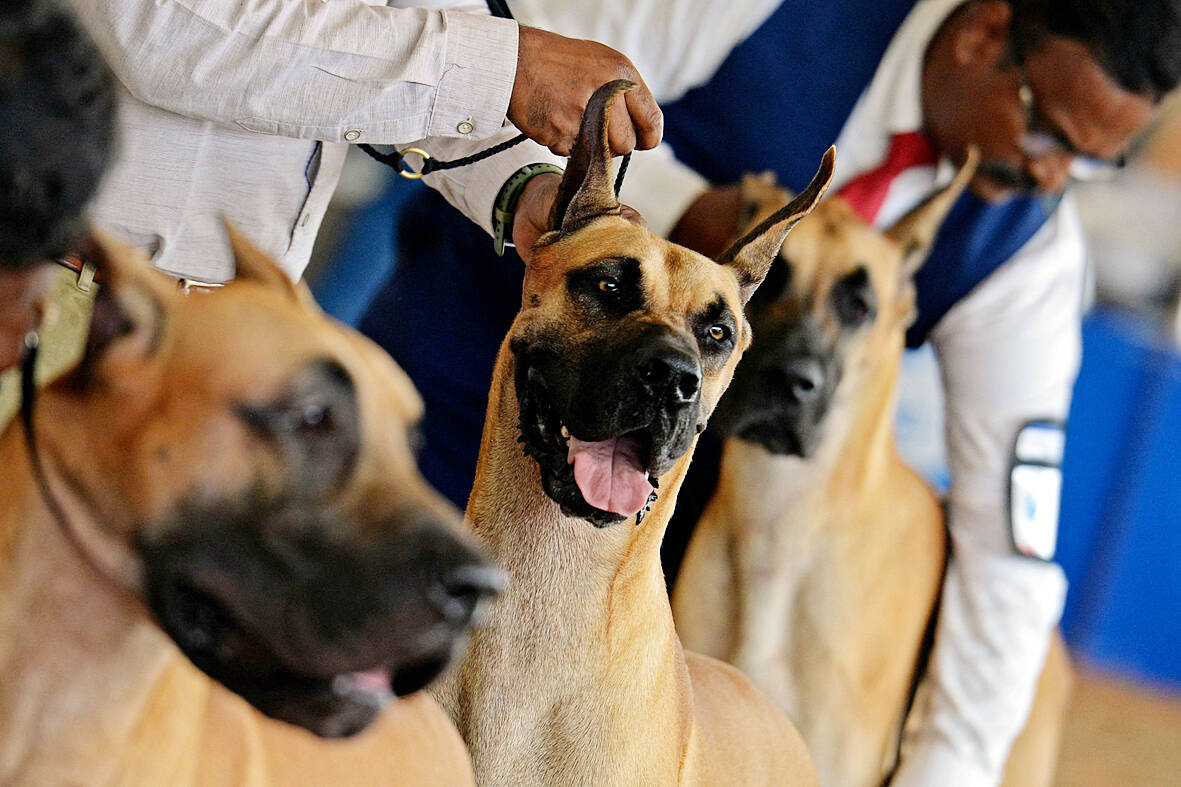Whether it’s a tricky maths problem or an unexpected bill, daily life is full of stressful experiences. Now researchers have found that humans produce a different odor when under pressure — and dogs can sniff it out.
While previous studies have suggested canines might pick up on human emotions, possibly through smell, questions remained over whether they could detect stress and if this could be done through scent.
“This study has definitively proven that people, when they have a stress response, their odor profile changes,” said Clara Wilson, a PhD student at Queen’s University Belfast, and first author of the research.

Photo: AFP
Wilson added the findings could prove useful when training service dogs, such as those that support people with post-raumatic stress disorder (PTSD).
“They’re often trained to look at someone either crouching down on the floor, or starting to do self-injurious behaviors,” said Wilson.
The latest study, she said, offers another potential cue.

Photo: AP
“There is definitely a smell component, and that might be valuable in the training of these dogs in addition to all of the visual stuff,” said Wilson.
Writing in the journal Plos One, Wilson and colleagues report how they first constructed a stand bearing three containers, each topped by a perforated lid.
The researchers report they were able to train four dogs to indicate the container holding a particular breath and sweat sample, even when the line-up included unused gauze, samples from another person, or samples from the same person taken at a different time of day.

Photo: AFP
With the team confident the dogs understood the approach, they turned to breath and sweat samples collected from 36 people asked to count backwards from 9,000 in units of 17. The participants reported feeling stressed by the task and, for the 27 who carried it out in the laboratory, their blood pressure and heart rate rose.
The dogs were taught to pick out samples taken just after the task from a line-up that included two containers holding unused gauze.
The researchers then tested whether the dogs could do the same when the line-up included not only unused gauze but samples taken from the same participant just before the task, when they were more relaxed. Each set of samples was shown to a single dog in 20 trials.
The results reveal that the dogs chose the “stressed” sample in 675 out of the 720 trials.
“It was pretty amazing to see them be so confident in telling me ‘nope, these two things definitely smell different,’” said Wilson.
The team say while it was unclear what chemicals the dogs were picking up on, the study shows humans produce a different odor when stressed — confirming previous research that used instruments to analyze samples.
Wilson added that while the dogs were trained to communicate that they could tell different samples apart, it is possible that even untrained pet dogs might detect changes in odor when a human becomes stressed.
Claire Guest, co-founder and chief scientific officer at the charity Medical Detection Dogs, which was not involved in the research, said medical alert assistance dogs were trained to alert people with complex health conditions when they were in danger of having a potentially life-threatening medical event by detecting changes in their odor.
“Some of these conditions are thought to be due to a change in hormone levels so we are not surprised to learn that [dogs] can detect when humans are experiencing stress [as that can also be linked to hormonal fluctuations],” she said.

Jacques Poissant’s suffering stopped the day he asked his daughter if it would be “cowardly to ask to be helped to die.” The retired Canadian insurance adviser was 93, and “was wasting away” after a long battle with prostate cancer. “He no longer had any zest for life,” Josee Poissant said. Last year her mother made the same choice at 96 when she realized she would not be getting out of hospital. She died surrounded by her children and their partners listening to the music she loved. “She was at peace. She sang until she went to sleep.” Josee Poissant remembers it as a beautiful

March 2 to March 8 Gunfire rang out along the shore of the frontline island of Lieyu (烈嶼) on a foggy afternoon on March 7, 1987. By the time it was over, about 20 unarmed Vietnamese refugees — men, women, elderly and children — were dead. They were hastily buried, followed by decades of silence. Months later, opposition politicians and journalists tried to uncover what had happened, but conflicting accounts only deepened the confusion. One version suggested that government troops had mistakenly killed their own operatives attempting to return home from Vietnam. The military maintained that the

Before the last section of the round-the-island railway was electrified, one old blue train still chugged back and forth between Pingtung County’s Fangliao (枋寮) and Taitung (台東) stations once a day. It was so slow, was so hot (it had no air conditioning) and covered such a short distance, that the low fare still failed to attract many riders. This relic of the past was finally retired when the South Link Line was fully electrified on Dec. 23, 2020. A wave of nostalgia surrounded the termination of the Ordinary Train service, as these train carriages had been in use for decades

Lori Sepich smoked for years and sometimes skipped taking her blood pressure medicine. But she never thought she’d have a heart attack. The possibility “just wasn’t registering with me,” said the 64-year-old from Memphis, Tennessee, who suffered two of them 13 years apart. She’s far from alone. More than 60 million women in the US live with cardiovascular disease, which includes heart disease as well as stroke, heart failure and atrial fibrillation. And despite the myth that heart attacks mostly strike men, women are vulnerable too. Overall in the US, 1 in 5 women dies of cardiovascular disease each year, 37,000 of them